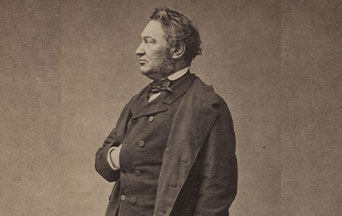
Pope Pius IX’s condemnation of the Count of Montalembert and the Congress of Catholic Scientists (sometimes called the first Mechlin Conference),1 as well as other measures taken by the Holy See, slowed the momentum of liberal Catholics. The second Mechlin Conference, held in 1864, no longer had such intense liberal hues. Montalembert was replaced by Bishop Felix Dupanloup of Orléans, who was more able but less ardent.
On the other hand, Rome continued fighting liberalism and missed no opportunity to praise and encourage ultramontane Catholics. The Holy Father wrote a letter approving a book by Count du Val de Beaulieu titled L’erreur libre dans l’État libre (“Free Error in a Free State”), countering Montalembert’s Mechlin speech. The pope also took advantage of the publication of Louis Veuillot’s Vie de Notre Seigneur Jésus Christ.
Eternal and Natural Law: The Foundation of Morals and Law
(Life of Our Lord Jesus Christ) to send the great journalist a brief fully approving his entire work.
After the closure of the newspaper l’Univers, Veuillot went to Rome before starting a new activity. His stay in the Eternal City was an absolute triumph. Everyone wanted to pay homage to the brave combatant. His visits, dinner invitations and meetings multiplied. In letters to his family and closest collaborators, he complained his social life did not allow him the seclusion he would like to have while visiting the center of Catholicism. He had no lack of job offers. Jules Mires, the banker, invited him to join the administration of the Roman railways, a lucrative position requiring little work. Veuillot refused the proposal because it would divert him from his mission. He placed himself entirely at the Holy Father’s disposal and wanted only to continue his apostolate.
Veuillot consulted with Rome on the advisability of publishing l’Univers outside France. The pope approved the idea and offered to contribute 100,000 francs. Other benefactors also came forward as soon as they heard the news. Certainly, restarting l’Univers would not have presented great financial difficulties. The whole project was supported by the Holy Father, including an agreement that the paper’s new head quarters would be in Belgium.
When Veuillot returned to France with all the documentation, including letters from the Holy See to the Nunciature, the French police seized his suitcases. They spread the rumor that they found evidence of imminent insurrection by Ultramontane Catholics. Although its dishonesty was evident, the government’s actions made it untimely to restart the newspaper in Belgium.
Veuillot was unable to collaborate with the French press and was also prevented from publishing l’Univers outside France. He decided to continue his apostolic activity and earn a living by dedicating himself to writing books. During his battles at l’Univers, he always regretted being unable to write the books he wanted with subjects he preferred. Newspaper work meant that he was always pressed by the needs and events of the moment. Diverted from journalism, he thought he could try to achieve the dreams he always cherished.
However, in this period, liberal Catholicism proved most virulent. Without his newspaper, Veuillot suffered from his inability to combat it as effectively as before. Furthermore, he could not choose the subjects of his books because the circumstances continued to impose other topics. Such was the case with Mélanges (Mixtures), a collection of his articles in l’Univers, Le Parfum de Rome (The Purfume of Rome), Le Pape et la diplomatie (The Pope and Diplomacy), L’Évangile du Monde (The Gospel of the World) and others, all ‘combat’ works. He also wrote Vie de Notre Seigneur Jésus Christ to make reparation for and refute Ernest Renan’s Vie de Jésus, which denied Our Lord’s divinity and His miracles.
 Learn All About the Prophecies of Our Lady of Good Success About Our Times
Learn All About the Prophecies of Our Lady of Good Success About Our Times
Veuillot suffered from his inability to fight the liberal onslaught efficiently. However, a letter from Pius IX consoled him in his ostracism. Few laymen have ever received such a complimentary document from the Holy See.
“We congratulate you, dear son, because, although diverted from the arena in which you fought for truth and justice with so much courage and results, you have not buried the talent entrusted to you but continued ardently and effectively serving the same cause you always defended. Your recent writings testify to this, as does the latest work you offered Us, the Life of Our Lord Jesus Christ, which you published to avenge His insulted Divinity.
“Leafing through a few of its pages amid Our manifold cares, We judge that you have chosen the best method to achieve your proposed end and dealt with the subject consistently. This fruit of your vigil offers Us a unique perspective because of the trials you are going through. In these dire circumstances, your work shows, now as in the past, your hunger and thirst for justice and the same mental readiness and steadfastness to keep up the struggle you have always waged.
“Therefore, although moved by your sorrows and inclined to share your lot, We nevertheless judge every complaint would be inappropriate, as the Apostle says: ‘Blessed is the man that endureth temptation,’ and adds, ‘My brethren, count it all joy, when you shall fall into divers temptations.’ (See James 1:12 and James 1:2.)
“That is why we are inclined to congratulate you and advise you to rejoice by seeing your constancy, which your tested faith has produced in you, that patience which is the crowning work.
“So that you may feel it more easily, We wish you and ask God to give you more abundant and fruitful graces. As a pledge of this heavenly gift, and in testimony to Our particular kindness and gratitude, We most affectionately impart the Apostolic Blessing upon you and yours.”

